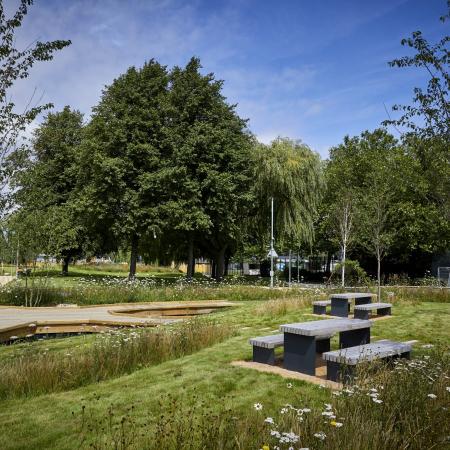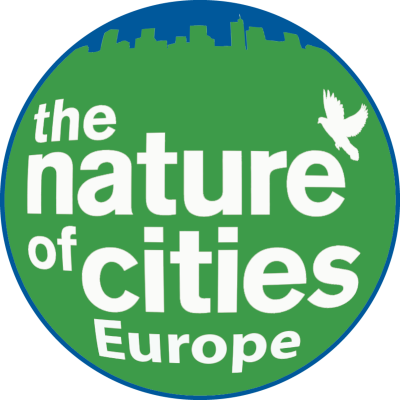
News originally published on the GrowGreen website. Republished with permission from GrowGreen.
The new West Gorton Community Park in Manchester, UK, is designed as a park that drinks water, aiming to reduce flood risk and providing a multitude of benefits for local residents.
West Gorton Community Park has several key features that aim to reduce storm water run-off and flooding by absorbing rain and slowing down the flow of water:
- The Garden: sensory planting lets the community relax in a sunken garden, which thrives on rainwater.
- Piazza space: a community event space offers an open lawn for informal recreation. The paving is designed to be fully permeable so that it absorbs heavy rainwater in storm situations. The rain is then filtered through a series of formal channels into a sunken garden.
- Bio-swale: rainwater is piped into a bio-swale, which is a ditch planted with vegetation. Timber check dams help slow the flow.
- The centre of the park, which is referred to as the meadow, is full of wildflowers, attracting beneficial insects like bees and boosting biodiversity.
- Rain garden: collects the rain in order to be absorbed by planting and the featured alder trees.
The aim of the project is to provide evidence to show the actual impact that green spaces have on not only the local community but also for responding to climate change as a nature-based solution. With the help of GrowGreen academic partners at the University of Manchester, the garden will be monitored for a number of years.
However, the project was as much community led as it was academically. Amy Wright from Groundwork, who were subcontracted by the Guinness Partnership, a partner in GrowGreen, to help with community engagement and provide community expertise in the area, explained that they held “Baseline consultations to find out what the current issues are in the area and how their current park was being used if at all.… They had a say throughout the design process. So, we conducted some more consultations around the different sketch designs and concept designs so they were able to feedback every step of the way on how the park would look”.
Local resident Heather Rangza said, “It is brilliant. Because I was part of the group that helped design the park, it feels like it belongs to you. It’s worth every penny!”
Matt Cordwell Armitage Primary Assistant Head Teacher determined that the park, “helped the children gain a keener understanding of the ecological benefits of having something like this on their doorstep in the community…We’re a bit blown away by the extent of what is here, there is a lot to be learned”.
This video gives an eco-tour of the park, explaining some of its key features:











